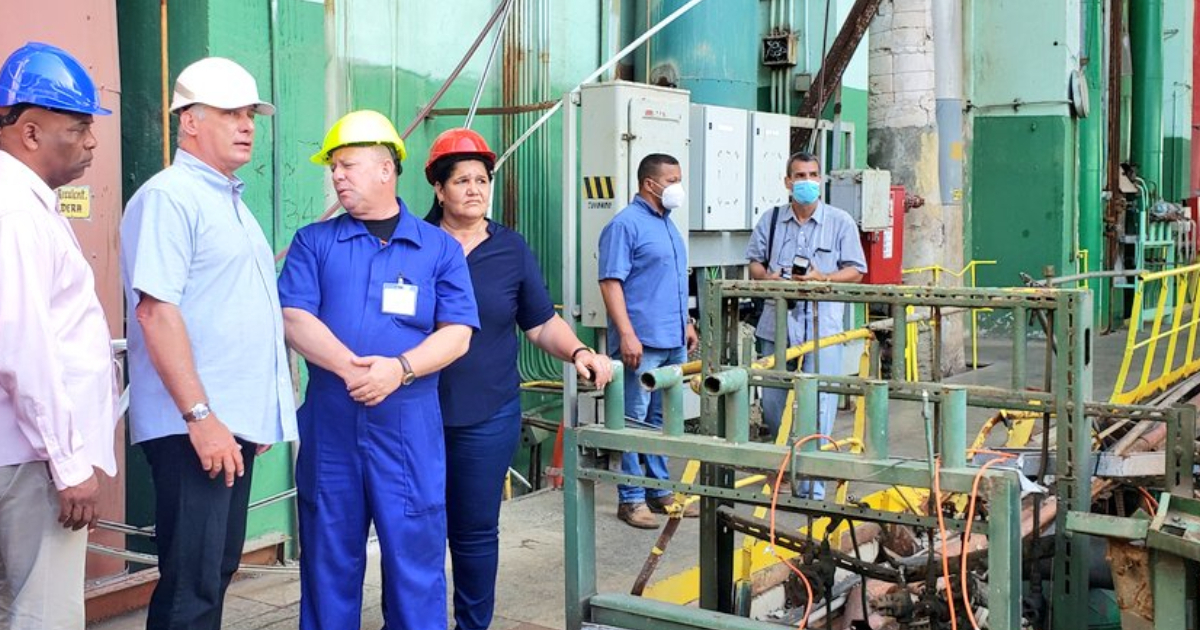The Cuban Electric Union (UNE) wants to, but it can't. This socialist state-run enterprise is currently torn between two communication strategies: offering a somewhat hopeful outlook to its users or preparing them for an even more "terrible and complex" scenario.
Trapped in the whirlpool of its generation capacity deficit and battered by the storm of opinions from Cubans enduring prolonged and frequent blackouts, the company led by Alfredo López Valdés is sinking slowly, unable to remedy the collapse of the national electric power system (SEN).
Burdened by outdated infrastructure, lack of investment, heavy and sulfur-laden crude oil, and the centrality of state-run enterprises in the post-communist design of leader Miguel Díaz-Canel, the SEN and the UNE are floundering in their own declarations, feigning transparency in a daily megawatt dance that is causing spasms among Cubans.
"With the possibility of being lynched online, the truth is that tonight the nation could face a 1,200 MW deficit. Tomorrow we will see UNE's figures. But (and there's always a but) Felton is getting ready to resume generation in a couple of days, maybe three. Also, recognizing that by mid-week, 500 MW will be added, so blackouts will be resurrected on time, but, in all honesty, we will have them," said official journalist José Miguel Solís on his social media this Monday.
For weeks, the UNE, regime leaders, and their official press have been saying that the blackouts are due to planned maintenance (a strategy announced by Díaz-Canel in 2022 to restore electricity generation in 2023), which will conclude by the end of June to ensure a summer without blackouts during the hottest months.
Can Zero Blackouts Be Guaranteed?
But who can guarantee "zero blackouts"?, recently wondered the first secretary of the Communist Party of Cuba (PCC). So now the strategy is to "reduce" blackouts, make them shorter and more bearable, as Minister of Energy and Mines Vicente de la O Levy recently stated, adding that, as they currently occur, blackouts are "a tolerable annoyance."
The designated leader who promised to stabilize the SEN in 2023 and end the "terrible" blackouts by June, before summer, now says yes, but no, that the situation will improve, but not entirely.
The UNE is also caught in these ambiguities, celebrating the synchronization of the Nuevitas Unit 6 with the SEN after 77 days of maintenance, only to disconnect again in less than 24 hours, restore (it's "normal" for these things to happen, stated one of its directors), and reappear on the list of broken units published by the company in its daily social media update (just yesterday, for instance), although in his live report, Engineer Lázaro Guerra Hernández, UNE's technical director, said it was operational.
Now it's time to entertain customers with the Felton Thermoelectric Unit 1, which the Cuban Television News celebrated yesterday as entering the "final phase of scheduled maintenance" and expected to synchronize with the SEN this Wednesday, highlighting the "labor feat" of its workers.
Official journalist Bernardo Espinosa hardly has enough time to explain what is happening with the SEN and UNE's decisions. Loose ends remain in all his reports, which do not seek the truth (an impossible mission in a totalitarian regime without freedom of the press) but to propagate the dictates of the Palace, that air-conditioned stronghold where the "yes but no" becomes the art of governing the so-called "continuity."
Understanding the Cuban Electric Crisis
This section addresses key questions and answers related to the current situation with the Cuban Electric Union and the nation's power system.
What are the main causes of the power outages in Cuba?
The main causes include outdated infrastructure, lack of investment, and reliance on heavy and sulfur-laden crude oil, along with centralized state-run enterprise policies.
What has the Cuban government promised regarding the power outages?
The government, led by Miguel Díaz-Canel, promised to stabilize the national electric power system (SEN) by 2023 and end the severe blackouts by June, before summer.
How has UNE tried to address the power generation issues?
UNE has attempted to address the issues by performing scheduled maintenance on various units, such as the Nuevitas Unit 6 and Felton Thermoelectric Unit 1, although these efforts have often been met with setbacks.
Why is there skepticism about the government's ability to solve the power crisis?
Skepticism arises due to the frequent contradictions in official statements, the continual failures of power units, and the historical inability of the regime to modernize and effectively manage the power infrastructure.
